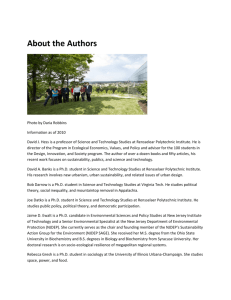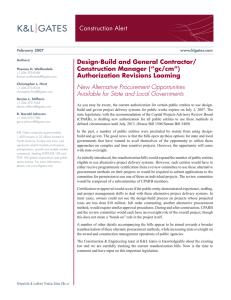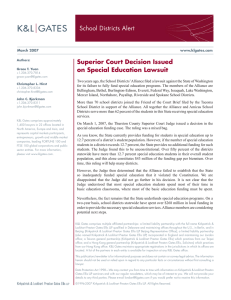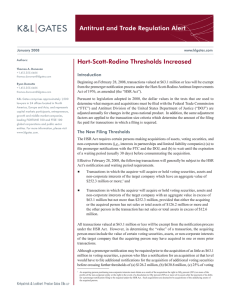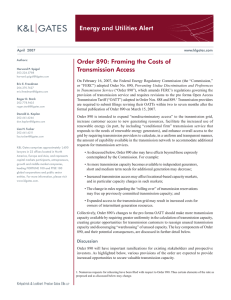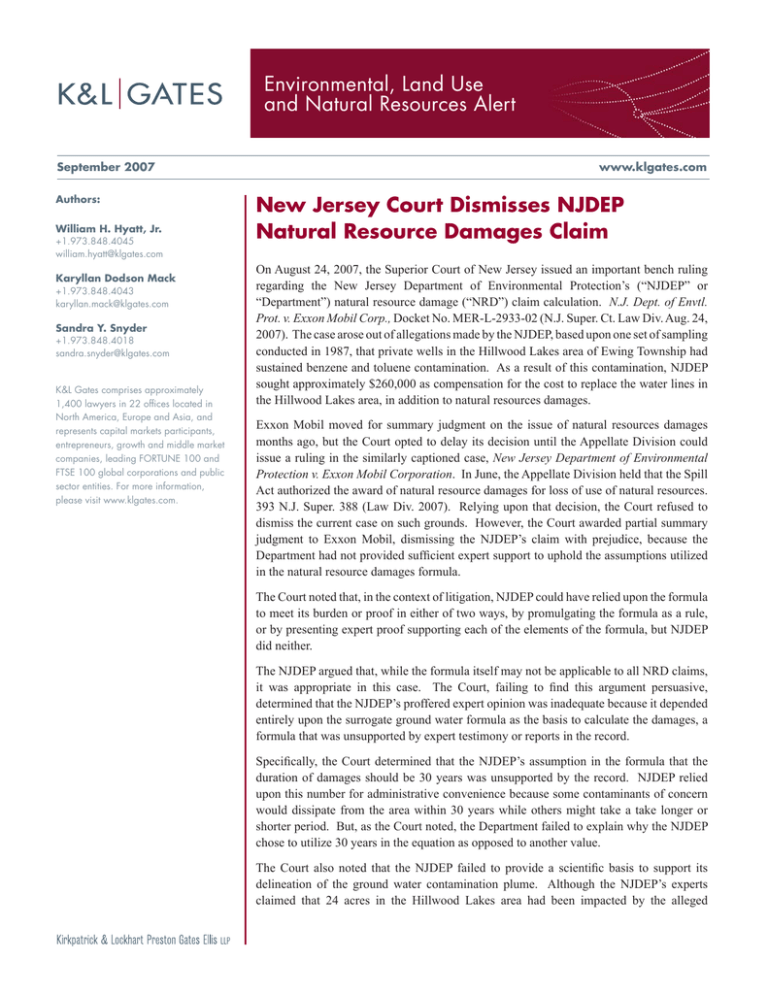
Environmental, Land Use
and Natural Resources Alert
September 2007
Authors:
William H. Hyatt, Jr.
+1.973.848.4045
william.hyatt@klgates.com
Karyllan Dodson Mack
+1.973.848.4043
karyllan.mack@klgates.com
Sandra Y. Snyder
+1.973.848.4018
sandra.snyder@klgates.com
K&L Gates comprises approximately
1,400 lawyers in 22 offices located in
North America, Europe and Asia, and
represents capital markets participants,
entrepreneurs, growth and middle market
companies, leading FORTUNE 100 and
FTSE 100 global corporations and public
sector entities. For more information,
please visit www.klgates.com.
www.klgates.com
New Jersey Court Dismisses NJDEP
Natural Resource Damages Claim
On August 24, 2007, the Superior Court of New Jersey issued an important bench ruling
regarding the New Jersey Department of Environmental Protection’s (“NJDEP” or
“Department”) natural resource damage (“NRD”) claim calculation. N.J. Dept. of Envtl.
Prot. v. Exxon Mobil Corp., Docket No. MER-L-2933-02 (N.J. Super. Ct. Law Div. Aug. 24,
2007). The case arose out of allegations made by the NJDEP, based upon one set of sampling
conducted in 1987, that private wells in the Hillwood Lakes area of Ewing Township had
sustained benzene and toluene contamination. As a result of this contamination, NJDEP
sought approximately $260,000 as compensation for the cost to replace the water lines in
the Hillwood Lakes area, in addition to natural resources damages.
Exxon Mobil moved for summary judgment on the issue of natural resources damages
months ago, but the Court opted to delay its decision until the Appellate Division could
issue a ruling in the similarly captioned case, New Jersey Department of Environmental
Protection v. Exxon Mobil Corporation. In June, the Appellate Division held that the Spill
Act authorized the award of natural resource damages for loss of use of natural resources.
393 N.J. Super. 388 (Law Div. 2007). Relying upon that decision, the Court refused to
dismiss the current case on such grounds. However, the Court awarded partial summary
judgment to Exxon Mobil, dismissing the NJDEP’s claim with prejudice, because the
Department had not provided sufficient expert support to uphold the assumptions utilized
in the natural resource damages formula.
The Court noted that, in the context of litigation, NJDEP could have relied upon the formula
to meet its burden or proof in either of two ways, by promulgating the formula as a rule,
or by presenting expert proof supporting each of the elements of the formula, but NJDEP
did neither.
The NJDEP argued that, while the formula itself may not be applicable to all NRD claims,
it was appropriate in this case. The Court, failing to find this argument persuasive,
determined that the NJDEP’s proffered expert opinion was inadequate because it depended
entirely upon the surrogate ground water formula as the basis to calculate the damages, a
formula that was unsupported by expert testimony or reports in the record.
Specifically, the Court determined that the NJDEP’s assumption in the formula that the
duration of damages should be 30 years was unsupported by the record. NJDEP relied
upon this number for administrative convenience because some contaminants of concern
would dissipate from the area within 30 years while others might take a take longer or
shorter period. But, as the Court noted, the Department failed to explain why the NJDEP
chose to utilize 30 years in the equation as opposed to another value.
The Court also noted that the NJDEP failed to provide a scientific basis to support its
delineation of the ground water contamination plume. Although the NJDEP’s experts
claimed that 24 acres in the Hillwood Lakes area had been impacted by the alleged
Environmental, Land Use
and Natural Resources Alert
contamination, none of the experts involved had
an adequate scientific explanation for utilizing that
area. Similarly, the Department also lacked adequate
support for its assumption regarding the cost of
providing public water. Because ground water cannot
be easily valued in the marketplace, the Court opined
that the Department should have utilized rule making
to justify a default value so that the number used in the
damages calculation could be subjected to notice and
comment. The Court concluded that, while agencies
need to make some assumptions for “administrative
convenience,” they do not have free reign to make
such assumptions without also providing adequate
scientific support.
The Court’s decision here does not go so far as to
hold that the ground water surrogate value calculation
cannot be supported. Rather, the Court emphasized
that because the Department opted not to follow the
rule making process to establish a natural resources
damages formula, the NJDEP had to provide adequate
scientific support for the assumptions used in the
formula. While the Court noted that there may be
adequate proofs available somewhere to support the
use of those assumptions in this case, they were not
presented by the NJDEP. Hence, the formula must be
rejected in this instance.
It would seem, as a matter of efficiency, the NJDEP’s
next step would be to proceed with rule making rather
than defend the assumptions utilized in its natural
resources damages formula on a case by case basis;
however, the Department has not yet made any
meaningful progress on this front. In fact, the Court
further stressed the appropriateness of rule making by
alluding to the New Jersey Society of Environmental
& Economic Development v. Campbell (“NJSEED”)
case (Docket No. MER-L-343-04 (N.J. Super. Law
Div., Mercer County) (Sabatino, J.)), reminding the
NJDEP that it settled that particular case by agreeing
to subject the ground water formula utilized in natural
resource damages to administrative rule making.
Although no such proposed rule has been published,
there seem to be clear indications that rule making is
appropriate and should be forthcoming. In the interim,
companies involved in cases or settlement discussions
wherein the NJDEP has calculated natural resource
damages using this formula may have the benefit,
even if temporary, of relying upon the Exxon Mobil
decision to improve their bargaining positions since
the NJDEP clearly cannot rely upon the formula in
future litigation proceedings, without first developing
further scientific justification in each case’s record for
the assumptions used in the formula.
K&L Gates comprises multiple affiliated partnerships: a limited liability partnership with the full name Kirkpatrick & Lockhart Preston Gates
Ellis LLP qualified in Delaware and maintaining offices throughout the U.S., in Berlin, and in Beijing (Kirkpatrick & Lockhart Preston Gates Ellis
LLP Beijing Representative Office); a limited liability partnership (also named Kirkpatrick & Lockhart Preston Gates Ellis LLP) incorporated in
England and maintaining our London office; a Taiwan general partnership (Kirkpatrick & Lockhart Preston Gates Ellis) which practices from
our Taipei office; and a Hong Kong general partnership (Kirkpatrick & Lockhart Preston Gates Ellis, Solicitors) which practices from our Hong
Kong office. K&L Gates maintains appropriate registrations in the jurisdictions in which its offices are located. A list of the partners in each
entity is available for inspection at any K&L Gates office.
This publication/newsletter is for informational purposes and does not contain or convey legal advice. The information herein should not be
used or relied upon in regard to any particular facts or circumstances without first consulting a lawyer.
Data Protection Act 1998—We may contact you from time to time with information on Kirkpatrick & Lockhart Preston Gates Ellis LLP seminars
and with our regular newsletters, which may be of interest to you. We will not provide your details to any third parties. Please
e-mail london@klgates.com if you would prefer not to receive this information.
©1996-2007 Kirkpatrick & Lockhart Preston Gates Ellis LLP. All Rights Reserved.
September 2007 | 2

